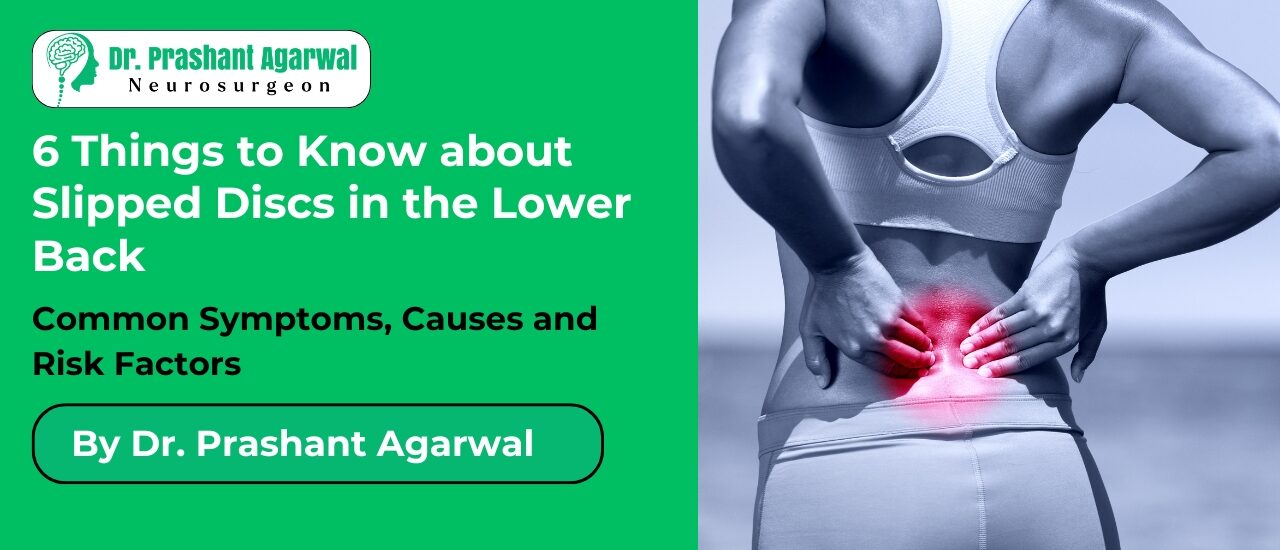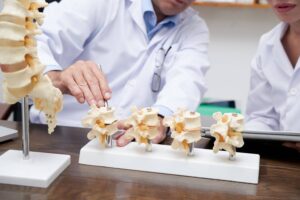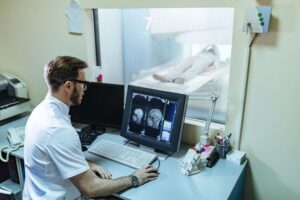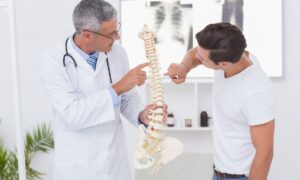What are a Slipped Discs?
To understand a slipped discs, it’s essential to know the basic anatomy of the spine. The spine consists of 24 vertebrae stacked on top of each other, separated by intervertebral discs. These discs act as cushions, absorbing shocks and facilitating movement. Each disc has two components:
-
Nucleus Pulposus: A soft, gel-like center.
-
Annulus Fibrosus: A tough, fibrous outer layer.
A slipped discs occurs when the nucleus pulposus protrudes through the annulus fibrosus. This herniation can compress nearby nerves, causing pain and other symptoms.
If you’ve ever experienced a slipped disc, you know how debilitating it can be. Dr. Prashant Agarwal, a leading spine surgeon in Greater Noida, shares crucial insights into this common condition. Here’s what you need to know:
1. Understanding Slipped Discs
Slipped discs, also known as a herniated or prolapsed disc, occurs when the soft inner gel of the disc protrudes through a tear in the outer layer. This can put pressure on nearby nerves, leading to pain, numbness, or weakness, primarily in the lower back and legs.
2. Common Causes of Slipped Discs
Several factors contribute to the development of a slipped disc. These include:
-
Aging: Over time, discs lose water content, becoming less flexible and more prone to tearing or rupturing.
-
Trauma: Sudden injuries, such as falls or accidents, can cause disc herniation.
-
Improper Lifting: Using incorrect techniques to lift heavy objects puts undue stress on the spine.
-
Repetitive Strain: Repeated motions or prolonged physical activity can lead to wear and tear on the discs.
-
Obesity: Excess body weight increases pressure on the spine.
-
Genetics: A family history of herniated discs may predispose individuals to this condition.
3. Prevention Tips
Preventing a slipped discs involves maintaining a healthy spine. Here are practical tips:
-
Exercise Regularly:
-
Focus on core-strengthening exercises to support the spine.
-
Incorporate stretching routines to maintain flexibility.
-
-
Maintain a Healthy Weight:
-
Excess weight increases strain on the spine. A balanced diet and regular exercise can help.
-
-
Practice Good Posture:
-
Sit and stand with a straight back to minimize spinal stress.
-
Use ergonomic furniture to support natural alignment.
-
-
Lift Properly:
-
Bend at the knees and keep the back straight while lifting heavy objects.
-
-
Avoid Prolonged Sitting or Standing:
-
Take regular breaks to stretch and move, especially during long work hours.
-
-
Stay Hydrated:
-
Proper hydration maintains slipped discs elasticity and reduces the risk of degeneration.
-
4. Diagnostic Methods
Accurate diagnosis is critical for effective treatment. Dr. Prashant Agarwal, an expert in slip disc treatment in Greater Noida, employs several diagnostic tools:
Physical Examination: Assessing your symptoms and medical history
Imaging Tests: MRI and CT scans provide detailed images of your spine to identify the herniated disc.
Nerve Tests: Electromyography (EMG) may be used to measure electrical activity in the muscles
5. Treatment Options
Treatment for a slipped disc ranges from conservative methods to surgical interventions:
Rest and Activity Modification: Avoiding activities that exacerbate the pain.
Medications: Pain relievers, anti-inflammatory drugs, and muscle relaxants
Physical Therapy: Exercises to strengthen the back and improve flexibility.
Injections: Corticosteroid injections can reduce inflammation and pain.
Surgery: In severe cases, surgical options such as microdiscectomy or laminectomy may be necessary. Dr. Prashant Agarwal, a reputed spine surgeon in Greater Noida, specializes in these procedures.
Endoscopic Spine Surgery
Endoscopic spine surgery is a revolutionary technique that uses small incisions and specialized instruments to treat spine conditions, including slipped discs. This method involves the use of an endoscope, a tiny camera that provides a clear view of the affected area on a monitor, allowing the surgeon to perform precise and targeted procedures.
Benefits of Endoscopic Spine Surgery:
Minimally Invasive: Smaller incisions result in less damage to surrounding tissues.
Reduced Pain: Patients typically experience less post-operative pain compared to traditional surgery.
Faster Recovery: Shorter hospital stays and quicker return to daily activities.
Lower Infection Risk: Smaller incisions lower the risk of infection.
Dr. Prashant Agarwal, an expert in slip disc treatment in Greater Noida, is proficient in endoscopic spine surgery, ensuring patients receive the most advanced and effective care.
Minimally Invasive Spine Surgery
Minimally invasive spine surgery (MISS) is another advanced surgical option for treating spine disorders like slipped discs. MISS techniques involve smaller incisions and less muscle disruption compared to traditional open surgery. These procedures often use specialized instruments and imaging technology to treat the affected area with high precision.
Advantages of Minimally Invasive Spine Surgery:
Smaller Incisions: Leads to less scarring and quicker healing.
Reduced Blood Loss: Less invasive techniques minimize blood loss during surgery.
Less Pain: Patients typically experience less pain post-surgery.
Shorter Recovery Time: Faster recovery enables a quicker return to normal activities.
High Success Rates: Effective in alleviating pain and restoring function.
Dr. Prashant Agarwal, a distinguished spine surgeon in Greater Noida, offers minimally invasive spine surgery to patients, providing them with state-of-the-art care that emphasizes safety and efficacy.
Whether you are considering traditional or minimally invasive options, consulting with a specialist like Dr. Prashant Agarwal ensures you receive a tailored treatment plan that addresses your specific needs and promotes optimal recovery.
6. Prevention Tips
Preventing a slipped discs involves adopting a healthy lifestyle and taking care of your spine:
Maintain a Healthy Weight: Reduces pressure on the spine.
Exercise Regularly: Strengthens the muscles supporting the back.
Practice Good Posture: Especially when sitting and lifting heavy objects.
Stay Active: Regular physical activity helps keep your spine healthy.
Conclusion:
Understanding and addressing slipped discs is crucial for maintaining a healthy spine and overall well-being. If you are experiencing symptoms or need expert advice, consult Dr. Prashant Agarwal, a specialist in slip disc treatment in Greater Noida. His comprehensive approach to spine care can help you find relief and get back to your daily activities.





